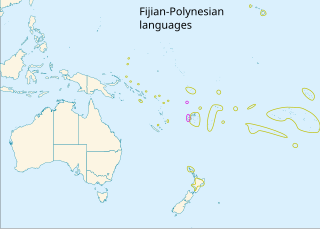Related Research Articles

Viti Levu is the largest island in Fiji. It is the site of the country's capital and largest city, Suva, and home to a large majority of Fiji's population.
Burebasaga is the largest of the three confederacies that make up Fiji's House of Chiefs, to which some of the Fijian chiefs belong.

The Central Pacific languages, also known as Fijian–Polynesian languages, are a branch of the Oceanic languages spoken in Fiji and Polynesia.
Semesa Koroikilai Sikivou, CBE was a Fijian academic, politician, and diplomat.

The Central Division of Fiji is one of Fiji's four divisions. It consists of five provinces - Naitasiri, Namosi, Rewa, Serua and Tailevu.

The Colonial Cup is a defunct rugby union football competition that was played in Fiji between 2004 and 2008. The Colonial Cup was Fiji's first attempt at a professional rugby competition, but it did not draw sufficient crowds and ceased after five seasons.
Palagi or papalagi (plural) is a term in Samoan culture of uncertain etymology, sometimes used to describe foreigners.
Ted Young is a Fijian politician, who served in the Cabinet of Prime Minister Laisenia Qarase from 2001 to 2006. He was Minister for Regional Development from 2001 to 2006, when he became Minister of State for Provincial Development. He represented the Lomaivuna Namosi Kadavu Open Constituency, which he won on the Soqosoqo Duavata ni Lewenivanua (SDL) ticket in the general election of September 2001, defeating Samuela Nawalowalo of the Soqosoqo ni Vakavulewa ni Taukei (SVT). He had previously sought to win the seat at the 1999 election, for the Fijian Association Party (FAP), but was defeated by Konisi Yabaki of the Soqosoqo ni Vakavulewa ni Taukei (SVT)..

Beqa is an island in Fiji, an outlier to the main island of Viti Levu, 10 kilometres to the south. The island has a land area of 36.3 square kilometres and reaches a maximum elevation of 440 metres. Beqa has 9 villages divided between 2 tikinas (districts): Sawau and Raviravi. To the west is the island of Yanuca.
Yanuca is an inhabited coral island in Fiji. It is administratively part of Serua province. The island has a land area of 1.5 square kilometres and reaches a maximum elevation of 100 metres. It is characterized by white sandy beaches and lush vegetation, and is now a camping site. To the east is the island of Beqa.
Naitasiri is one of the 14 provinces of Fiji and one of eight located on Viti Levu, Fiji's largest island. It is located in Central Division.
Namosi is one of Fiji's fourteen provinces and one of eight based in Viti Levu, the largest island. Located to the west of Suva, the province covers 570 square kilometers. Its population of 7,871 at the 2017 census was the second smallest of any Fijian province.
Ro is a title used by Fijian chiefs in the Province of Rewa, as well as in areas of Naitasiri, Namosi, and Serua Provinces.
Andrew Kenneth Pawley, FRSNZ, FAHA, is Emeritus Professor at the School of Culture, History and Language of the College of Asia and the Pacific at the Australian National University.
Western Fijian, also known as Wayan is an Oceanic language spoken in Fiji by about 57,000 people.
Fijian tradition and ceremony is a living way of life that has evolved as the Fijian nation has modernised over time, with various external influences from Pacific neighbours, and the European and Asian society. This general overview of various aspects of Fijian tradition, social structure and ceremony, much of it from the Bauan Fijian tradition although there are variations from province to province, uses "Fijian" to mean indigenous Fijians or I Taukei rather than all citizens of Fiji, and the Fijian terms are most often of the Bauan dialect. Many social intricacies depend on one's inherited social position and the occasion one is confronted with: each will have a particular social etiquette.
Taukei ni Waluvu is a Fijian phrase for "Owner of the Flood." It is the traditional chiefly title of the warrior hill clan Siko-Natabutale of Nairukuruku village. The history of the clan from the mid- nineteenth century, represent the social structures of the chiefly system, religion and western culture that supported colonialism in Fiji. Tradition, Christianity and British indirect rule were combined to legitimize what was accepted as the right way to govern. Condemned by some modern day critics as exploitative, the Fijian chiefly system was the medium of native social interdependence and a traditional contract shared by the indigenous clans of pre-colonial Fiji, that was utilized for colonial rule. Since Independence the chiefly system has had to adapt to the demands of modernity. Anthropologist Arthur Capell in his study of early tribal migration within Fiji made the point that, "the history of Fiji is the history of chiefly families." The phrase in fact emphasized the hierarchical nature of Fijian traditional society where chiefly power was held sacred. The relationship between Chiefs and Westerners in especially Missionaries thus became a focal point for gathering insight into Fijian culture and tradition in the nineteenth century. James Turner a latter anthropologist found, "The chiefly families of Nairukuruku were the first in the eastern highlands of Viti Levu to declare their allegiance to the central government and as a result of this support their influence expanded throughout the area".
In Fiji, Turaga na Roko Tui Bau is a vassal chief of the Vunivalu of Bau. From his seat at the residence of Naicobocobo, the Roko Tui Bau rules the Vusaratu chiefs and has relationships with the Roko Tui Dreketi, Ratu Mai Verata, Roko Tui Namata, Roko Tui Veikau, Tui Vuya and other members of Fiji's House of Chiefs.
The Farebrother-Sullivan Trophy is a Fijian rugby union competition open to the regional representative teams of the districts of Fiji.
Proto-Central Pacific is the reconstructed ancestor of the Central Pacific languages. It belongs to the Oceanic branch of the Austronesian languages.
References
- ↑ Namosi-Naitasiri-Serua at Ethnologue (18th ed., 2015) (subscription required)